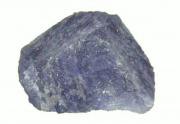Tanzanite
Jump to navigation
Jump to search


Description
A pale-color transparent mineral that has been used as a Gemstone. Tanzanite is a variety of Zoisite composed of calcium aluminum silicate. Blue gem-quality stones were discovered in Tanzania in 1967. Tanzanite may be colorless, yellow-green, brown or bluish purple and refract flashes of blue, magenta and yellow. Most crystals are greenish gray and contain traces of Vanadium. These stones are commonly heat treated (600-700C) to produce a strong sapphire blue color gem.
Synonyms and Related Terms
zoisite; Tansanit (Deut.); tanzanita (Esp.); tanzanite (Fr.)

IR spectrum of tanzanite from RRUFF

Raman spectrum of tanzanite from RRUFF
Physical and Chemical Properties
- Luster = vitreous
- Cleavage = perfect in one direction
- Fracture = uneven.
- Streak = white
- Mohs Hardness = 6.0 - 6.5
- Density = 3.2-3.4 g/ml
- Refractive index = 1.691-1.700
- Birefringence = 0.008 - 0.013
- Pleochroism = Strong; usually blue, purplish red and greenish yellow
- Fluorescence = inert
Comparisons
Properties of Common Gemstones
Resources and Citations
- Mineralogy Database: Zoisite
- R.F.Symmes, T.T.Harding, Paul Taylor, Rocks, Fossils and Gems, DK Publishing, Inc., New York City, 1997
- Encyclopedia Britannica, http://www.britannica.com Comment: "tanzanite" [Accessed 28 Sept. 2005].
- C.W.Chesterman, K.E.Lowe, Audubon Society Field Guide to North American Rocks and Minerals, Alfred A. Knopf, New York, 1979
- Wikipedia: http://en.wikipedia.org/wiki/Tanzanite (Accessed Sept. 28, 2005)
- Random House, Webster's Encyclopedic Unabridged Dictionary of the English Language, Grammercy Book, New York, 1997
- The American Heritage Dictionary or Encarta, via Microsoft Bookshelf 98, Microsoft Corp., 1998

